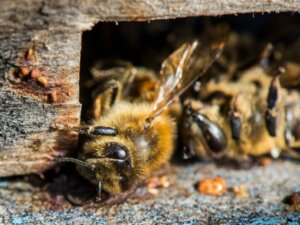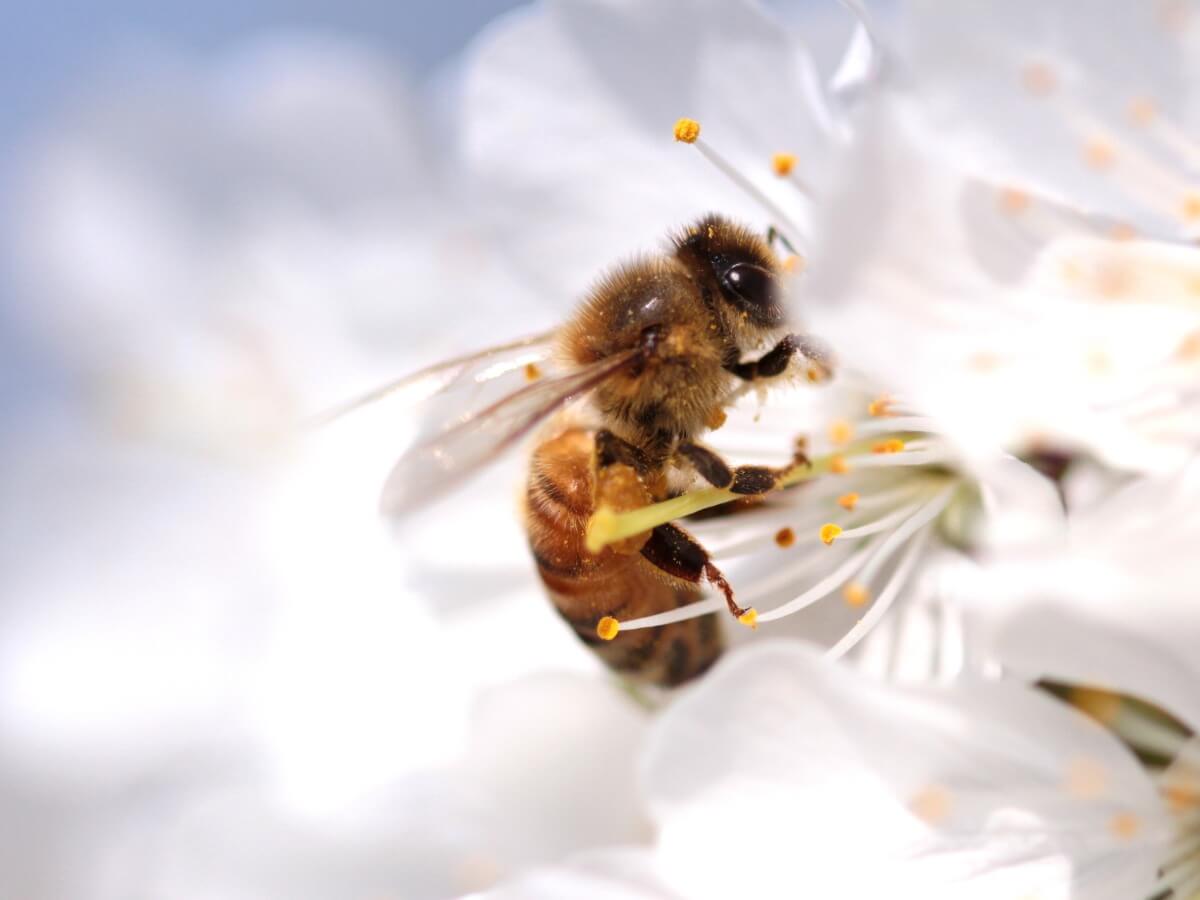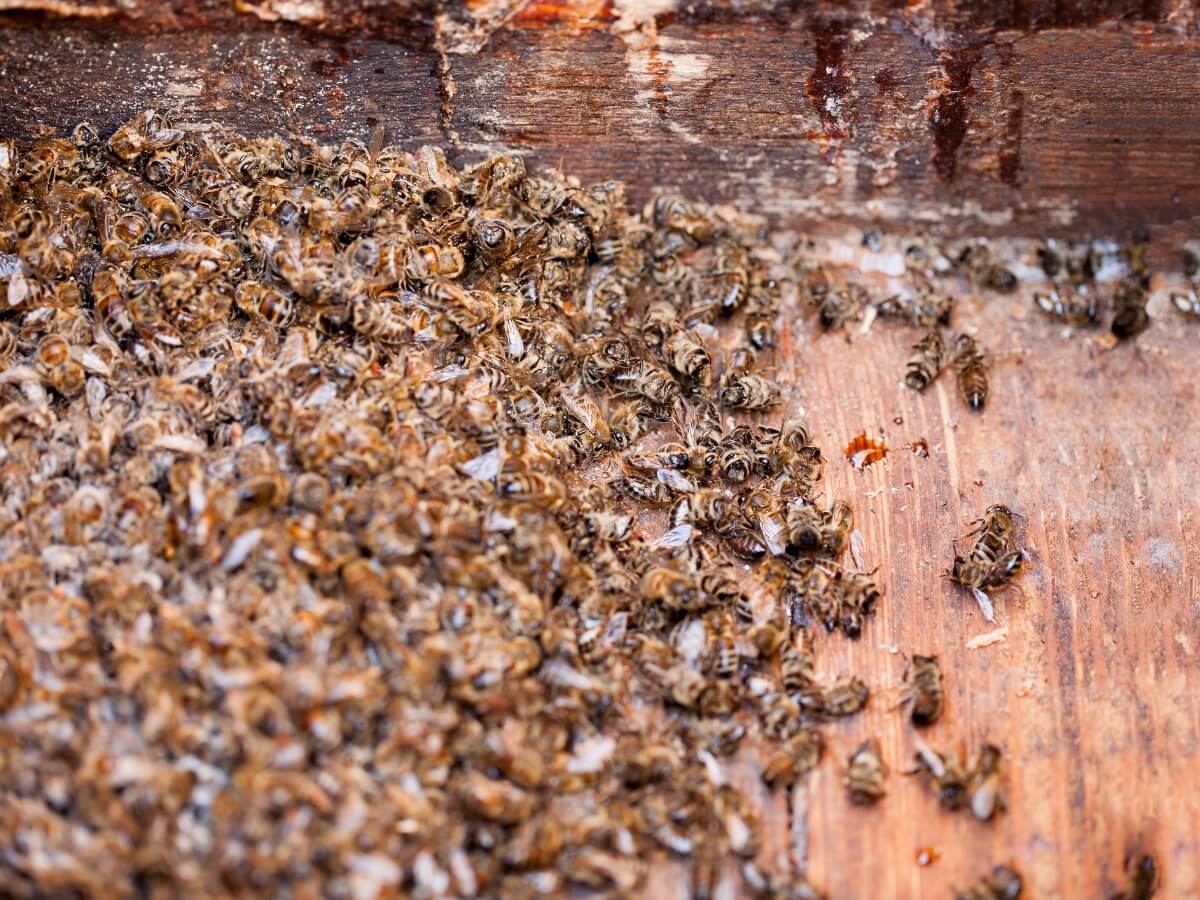Almond Milk Production is Killing Billions of Bees


Written and verified by the biologist Samuel Sanchez
In the last decade, the importance of pollinating bees (Apis mellifera) has been emphasized on a social level for two reasons. Their decline is due to harmful agricultural activities and their recognized role as pillars of ecosystems. You may have read the following news item ecently: “Almond milk production is killing bees.” How much truth is there in this statement?
While it’s true that intensive crops and insecticides are to blame for the population decline of many species, not everything can be attributed to consumer demands. Is consumer demand for alternatives to cow’s milk the problem? What about the aggressive means of production that are required to make certain foods?
The news
In January 2020, the prestigious British newspaper The Guardian published the following item: Like Sending Bees to War: The Deadly Truth Behind Your Almond Milk Obsession. The article begins by recounting the experience of Dennis Arp, a breeder of pollinating bees (Apis mellifera) in charge of producing honey.
As indicated by the cited source, approximately half of the economic benefit of this professional comes from “renting” his hives from February and March for the pollination of almond trees in California’s fertile Central Valley. 80% of the world’s almond products are produced here, including its milk.
Unfortunately for Dennis, the bee colonies began to die as winter set in. Harmful mite infestations wiped out 12% of their populations in just a few months, something totally unexpected.
This shouldn’t happen in a normal situation. So could pollination to obtain almond milk be indirectly killing bees? Next, we give you the answer.
In half a decade, the consumption of almond milk has increased by 250%.

Beyond the anecdote
Another report from The Guardian indicates that Dennis’s case isn’t an isolated one. They say that, on average, beekeepers lost 1 in 4 colonies in their possession between 2018 and 2019. This is the historical maximum recorded since this monitoring began 13 years ago – as compiled by Bee Informed Partnership.
However, there’s more. 50 billion bees have lost their lives. This information was revealed after analyzing the figures provided by more than 4,700 beekeepers in 50 US states.
The causes of the massive death of bees
All of this data is of great interest, but it still doesn’t answer the question of whether almond milk is directly killing American bees. According to the cited sources, the association between pollination of almond trees and the high mortality rate of A. mellifera could be due to the following triggers:
- An irresponsible use of pesticides. Pesticides are used for all kinds of agricultural activities. However, almond trees are sprayed with more than any other crop, as indicated by professional sources. Glyphosate, used globally in large-scale crops, has been shown to be harmful to bees.
- Dormant interruption. Hives cease their activity in winter due to low temperatures. They take advantage of this time to regain energy and strengthen themselves. Unfortunately, pollination of almond trees in California means that they have to “wake up” earlier than expected, in February or early March.
- Bee crowding. The total number of bees required to pollinate almond groves is much higher than would be required for pollination of apple and other trees. The accumulation of bees in a confined environment can promote the spread of mites, viruses, bacteria and other pathogens for these insects.
Beyond this, the massive release of Apis mellifera bees itself into American farm fields could have a deleterious effect on native species. Due to their large numbers and productive efficiency, these foreign animals could compete for resources with native species and displace them in the long term.
A necessary reflection
It seems clear that the pollination of almond trees affects bees. However, the prestigious Forbes magazine makes an essential reflection: blaming consumers is never the solution. It’s nothing new that the media blames people for these types of events. And yet there’s never enough talk about the aggressive practices of private corporations.
Is a story titled “The deadly truth behind your almond milk obsession” really necessary? The almond growers aren’t responsible for the death of the bees, but the mass production methods and the use of pesticides are. According to Forbes, the Monsanto company (of the Bayer group), manufacturer of glyphosate, would be the real culprit of this situation and to blame for the death of the bees.
The use of harmful pesticides on crops and the lack of respect for the normal biological cycles of animals are the real problem.

Almond trees don’t kill bees
In conclusion, we can affirm that the statement “the production of almond milk is killing billions of bees” is relatively true. However, there are many nuances. Almond trees (Prunus dulcis) don’t kill these hymenopterans, but companies wanting to produce at exorbitant levels for astronomical monetary benefits does.
Beyond blaming the consumer (who is oblivious to all this), the right thing to do would be to place the responsibility on those who really deserve it. In this case, it’s clearly the companies that are using production methods that are harmful to ecosystems and humans alike. So, what do you think?
In the last decade, the importance of pollinating bees (Apis mellifera) has been emphasized on a social level for two reasons. Their decline is due to harmful agricultural activities and their recognized role as pillars of ecosystems. You may have read the following news item ecently: “Almond milk production is killing bees.” How much truth is there in this statement?
While it’s true that intensive crops and insecticides are to blame for the population decline of many species, not everything can be attributed to consumer demands. Is consumer demand for alternatives to cow’s milk the problem? What about the aggressive means of production that are required to make certain foods?
The news
In January 2020, the prestigious British newspaper The Guardian published the following item: Like Sending Bees to War: The Deadly Truth Behind Your Almond Milk Obsession. The article begins by recounting the experience of Dennis Arp, a breeder of pollinating bees (Apis mellifera) in charge of producing honey.
As indicated by the cited source, approximately half of the economic benefit of this professional comes from “renting” his hives from February and March for the pollination of almond trees in California’s fertile Central Valley. 80% of the world’s almond products are produced here, including its milk.
Unfortunately for Dennis, the bee colonies began to die as winter set in. Harmful mite infestations wiped out 12% of their populations in just a few months, something totally unexpected.
This shouldn’t happen in a normal situation. So could pollination to obtain almond milk be indirectly killing bees? Next, we give you the answer.
In half a decade, the consumption of almond milk has increased by 250%.

Beyond the anecdote
Another report from The Guardian indicates that Dennis’s case isn’t an isolated one. They say that, on average, beekeepers lost 1 in 4 colonies in their possession between 2018 and 2019. This is the historical maximum recorded since this monitoring began 13 years ago – as compiled by Bee Informed Partnership.
However, there’s more. 50 billion bees have lost their lives. This information was revealed after analyzing the figures provided by more than 4,700 beekeepers in 50 US states.
The causes of the massive death of bees
All of this data is of great interest, but it still doesn’t answer the question of whether almond milk is directly killing American bees. According to the cited sources, the association between pollination of almond trees and the high mortality rate of A. mellifera could be due to the following triggers:
- An irresponsible use of pesticides. Pesticides are used for all kinds of agricultural activities. However, almond trees are sprayed with more than any other crop, as indicated by professional sources. Glyphosate, used globally in large-scale crops, has been shown to be harmful to bees.
- Dormant interruption. Hives cease their activity in winter due to low temperatures. They take advantage of this time to regain energy and strengthen themselves. Unfortunately, pollination of almond trees in California means that they have to “wake up” earlier than expected, in February or early March.
- Bee crowding. The total number of bees required to pollinate almond groves is much higher than would be required for pollination of apple and other trees. The accumulation of bees in a confined environment can promote the spread of mites, viruses, bacteria and other pathogens for these insects.
Beyond this, the massive release of Apis mellifera bees itself into American farm fields could have a deleterious effect on native species. Due to their large numbers and productive efficiency, these foreign animals could compete for resources with native species and displace them in the long term.
A necessary reflection
It seems clear that the pollination of almond trees affects bees. However, the prestigious Forbes magazine makes an essential reflection: blaming consumers is never the solution. It’s nothing new that the media blames people for these types of events. And yet there’s never enough talk about the aggressive practices of private corporations.
Is a story titled “The deadly truth behind your almond milk obsession” really necessary? The almond growers aren’t responsible for the death of the bees, but the mass production methods and the use of pesticides are. According to Forbes, the Monsanto company (of the Bayer group), manufacturer of glyphosate, would be the real culprit of this situation and to blame for the death of the bees.
The use of harmful pesticides on crops and the lack of respect for the normal biological cycles of animals are the real problem.

Almond trees don’t kill bees
In conclusion, we can affirm that the statement “the production of almond milk is killing billions of bees” is relatively true. However, there are many nuances. Almond trees (Prunus dulcis) don’t kill these hymenopterans, but companies wanting to produce at exorbitant levels for astronomical monetary benefits does.
Beyond blaming the consumer (who is oblivious to all this), the right thing to do would be to place the responsibility on those who really deserve it. In this case, it’s clearly the companies that are using production methods that are harmful to ecosystems and humans alike. So, what do you think?
All cited sources were thoroughly reviewed by our team to ensure their quality, reliability, currency, and validity. The bibliography of this article was considered reliable and of academic or scientific accuracy.
- ‘Like sending bees to war’: the deadly truth behind your almond milk obsession, The Guardian. Recogido a 3 de agosto en https://www.theguardian.com/environment/2020/jan/07/honeybees-deaths-almonds-hives-aoe
- US beekeepers lost 40% of honeybee colonies over past year, survey finds, Forbes. Recogido a 3 de agosto en https://www.theguardian.com/environment/2019/jun/19/us-beekeepers-lost-40-of-honeybee-colonies-over-past-year-survey-finds
- Almond Trees Aren’t Killing Bees; Pesticides And Corporate Greed Are, Forbes. Recogido a 3 de agosto en https://www.forbes.com/sites/lauratenenbaum/2020/01/15/almond-trees-arent-killing-bees-pesticides-and-corporate-greed-are/?sh=2121612e7f79
This text is provided for informational purposes only and does not replace consultation with a professional. If in doubt, consult your specialist.








